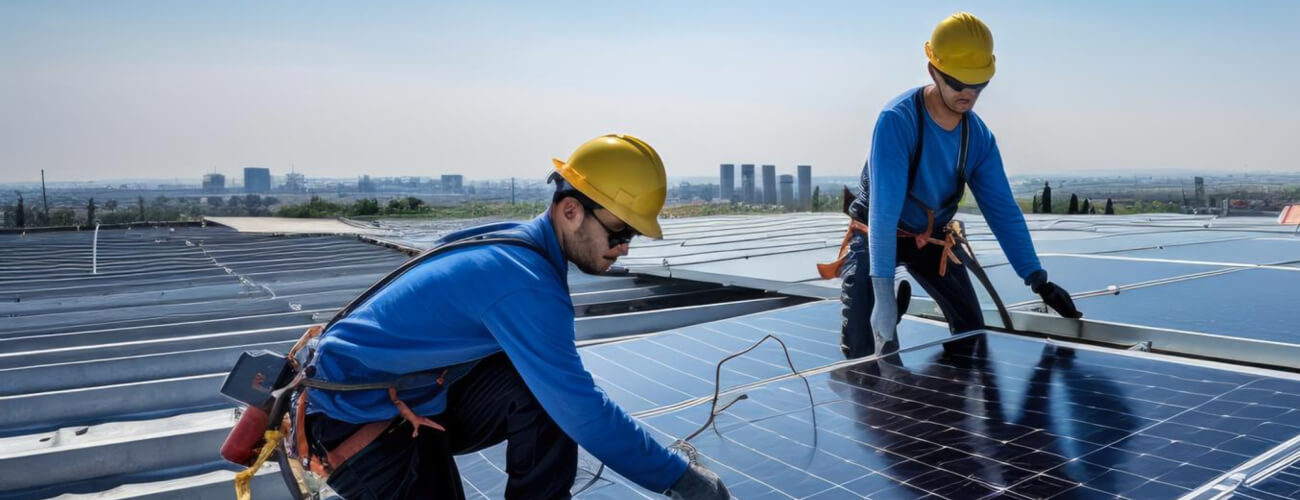
Off-grid solar installation refers to a system that operates independently of the main electrical grid. It typically includes solar panels, batteries for energy storage, a charge controller, and sometimes a backup generator. Off-grid solar installations are commonly used in remote areas where access to the grid is limited or unavailable.
These systems provide a reliable source of electricity for homes, cabins, RVs, boats, and other off-grid applications, allowing users to generate their own power without relying on traditional utility services. Off-grid solar installations offer energy independence and sustainability, making them an attractive option for those seeking to live off the grid or reduce their environmental footprint.
An off-grid solar system typically consists of solar panels, a charge controller, deep-cycle batteries, an inverter, wiring, mounting structures, and sometimes a backup generator for extended periods of low sunlight.

Provide autonomy from the utility grid, allowing users to generate their own electricity independently.
Significant savings on electricity bills over the long term, as users are not subject to utility rate increases.
By generating their own power, users can reduce or eliminate their dependence on traditional utility services, especially in remote areas.
Ut ut eros risus. In luctus fringilla augue, eget ultricies purus.
Ut ut eros risus. In luctus fringilla augue, eget ultricies purus.
Ut ut eros risus. In luctus fringilla augue, eget ultricies purus.

Lorem Ipsum is simply dummy text of the printing and typesetting industry. Lorem Ipsum has been standard dummy text ever since the 1500s.
In India, your residential solar system should be designed to meet your average annual electricity consumption. Typically, a 1 kWp Solar Power Plant generates approximately 3-4 kWh of electricity per day, totaling around 90-120 units per month. To estimate your solar panel requirements, review your past year's electricity bills to calculate your average monthly consumption, then divide by 90 or 120. For personalized guidance or a precise estimate, feel free to reach out to us. We're here to assist you every step of the way! Ornare suspendisse sed nisi lacus sed viverra.
A net-metered home solar system allows you to access grid electricity when solar production is insufficient, as solar panels generate power only during daylight hours. Excess solar energy generated on sunny days is fed back into the grid for credits. The net meter records energy flow in both directions, accurately reflecting your monthly energy usage and credits.
Certain homes may not be suitable for solar installations if their roofs receive limited sunlight due to obstacles such as neighboring properties casting shade or unfavorable roof orientation. A solar installer can conduct a thorough assessment of your roof's solar potential or may recommend alternative options such as participating in a community solar farm. This allows you to enjoy the benefits of solar energy without the need to install panels on your roof.
Regular cleaning and maintenance are essential for the ongoing operation of your home's solar system. Although rooftop solar installations rarely experience significant failures due to the absence of moving parts, it's crucial to ensure that your system remains in optimal condition. Many solar providers offer Annual Maintenance Contract (AMC) plans that cover routine maintenance tasks, including periodic inspections and comprehensive services. These maintenance packages help minimize downtime, enhance system performance, and extend the lifespan of your home solar system.
sales@powerex.co.in
+91 75598 84449
Powerex Industries (P) Limited Kottayam, Kerala - 686013

Where innovation meets illumination. Discover how we’re lighting up Kerala’s skyline with sustainable energy solutions,
Copyright © 2024 POWEREX. All rights reserved.